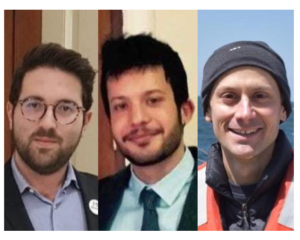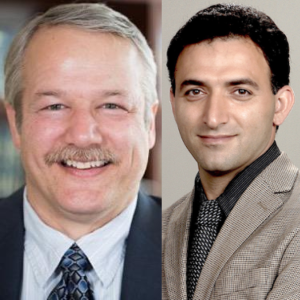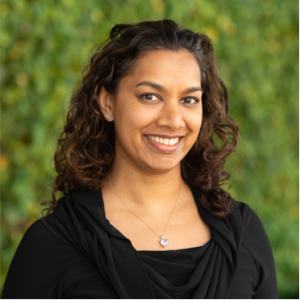The GW Technology Commercialization Office (TCO) is excited to announce the winners of the Technology Maturation Awards (TMAs) for Spring 2025. The TMAs aim to fast track high-potential GW inventions for real-world impact and commercial success.
TCO awarded TMAs to four projects. Each received $50,000 in internal research funding to facilitate development through consulting, proof-of-concept, prototyping, technology development and/or scale-up work. They also received complementary general patent and business consultations with leading startup law firm Wilson Sonsini. This funding will help our recipients demonstrate commercial viability and attract experienced industry partners to bring them closer to commercialization.
- Dr. Roberto Capanna, Dr. David Fierli, Dr. Matthew Rau: Rotating Tank Harvester for Microalgae Harvesting

Dr. Roberto Capanna, alongside co-investigators Dr. David Fierli and Dr. Matthew Rau, is developing the Rotating Tank Harvester (RTH)—an innovative system designed to dramatically improve the economics and sustainability of microalgae-based biofuel and bioproduct manufacturing. Unlike energy-intensive methods like centrifugation or filtration, the RTH gently aggregates microalgae using slow, horizontal rotation. This chemical-free process preserves cell integrity, reduces operational costs by up to 90%, and supports high-quality outputs suitable for food and pharmaceutical applications. The system’s scalability and compatibility with both open ponds and closed bioreactors make it ideal for a wide range of industrial bioeconomy uses.
This work builds on the patented GW technology “Revolutionizing Microalgae Harvesting Through Fluid Dynamic.” With support from the TMA, the team will scale the innovation to a 500-liter pilot system at HY-TEK Bio’s commercial facility, demonstrating real-world viability as the foundation for next-generation biorefineries.
- Dr. Ali Rahnavard & Dr. Keith Crandall: Compact, Targeted Genomic Language Models for Metagenomic Classification

Dr. Ali Rahnavard and Dr. Keith Crandall are advancing genomic analysis with their Compact, Targeted Genomic Language Models (TgLMs)—a platform designed to deliver faster, cheaper, and more accurate DNA sequencing analysis. Unlike traditional tools that rely on massive reference databases and alignment-based comparisons, TgLMs use a reference-free, alignment-free approach to enable real-time microbial classification. By combining a guided tokenizer that selects biologically meaningful DNA subsequences with a compact language model trained on domain-specific data, the technology offers rapid, memory-efficient, and highly sensitive profiling for applications in medicine, public health, agriculture, and environmental monitoring.
This work builds on the patented GW technology “microCafe: Revolutionizing Genomic Analysis with Large Language Models,” reflecting the team’s leadership in AI-powered genomics. With support from the TMA, the team will refine the tokenizer, benchmark lightweight TgLM prototypes, and deploy the technology as a cloud-based platform for sequencing labs to test at scale.
- Dr. Saniya LeBlanc: Dual-Manifold Thermoelectric Device for Heat Exchange and Power Production

Dr. LeBlanc and her team are developing a next-generation heat exchanger that not only transfers heat but also generates electricity by integrating thermoelectric materials into a triply periodic minimal surface (TPMS) lattice. This multifunctional design, made possible through additive manufacturing, embeds thermoelectric materials directly into the exchanger’s structure - overcoming the brittleness that typically limits these materials. The innovation holds immense potential for high-heat industries such as oil and gas, chemical manufacturing, and electrical infrastructure, offering a way to convert waste heat into usable onsite power.
This work builds on the patented GW technology “Dual Manifold Thermoelectric Heat Exchanger” and reflects Dr. LeBlanc’s broader expertise in thermoelectrics and sustainable energy systems. With support from the TMA, her team will fabricate and test a functional prototype, benchmark its performance against traditional heat exchangers, and demonstrate real-world power generation from industrial heat flows.
- Dr. Xitong Liu: Rinse-Free mLbL Reverse Osmosis Membranes for Cost-Efficient Water Purification

Dr. Xitong Liu introduces a new class of reverse osmosis (RO) membranes designed to reduce fouling, scaling, and chlorine degradation - key challenges in industrial water purification. His team’s rinse-free molecular-layer-by-layer (mLbL) fabrication process creates ultra-smooth, highly cross-linked polyamide membranes that maintain up to 99.9% salt rejection while reducing cleaning frequency by 90%, energy use by 40%, and extending membrane life up to 4x.
Unlike conventional methods, this rinse-free approach eliminates intermediate washing steps, enabling precise control over membrane chemistry and structure. This work is based on the GW technology “A design to manufacture polyamide reverse osmosis membrane using molecular layer-by-layer deposition.” TMA support will help Dr. Liu’s team bridge the gap from lab to market; supporting the optimization of a continuous roll-to-roll manufacturing process and the development of a functional prototype.






